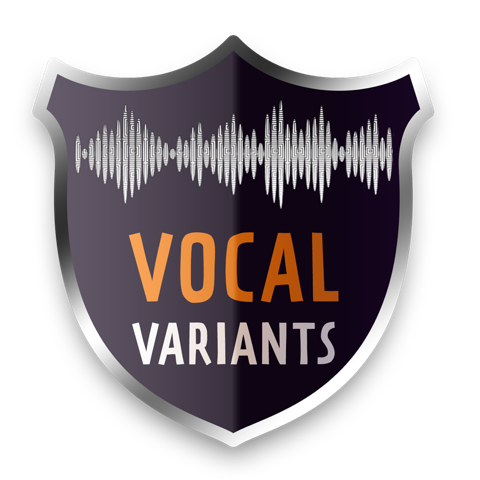|
VOICE OVER & AI: PART 1 How To Protect Your Vocal Identity And Use Amid The Proliferation Of AI / Synthetic Voices March 20, 2023  By Vocal Variants It seems like with each week comes a new article about a
miraculous new artificial intelligence (AI) algorithm that sounds eerily close to a real human voice,
spawning debate and panic in various voice over communities.
But we're not here to argue the quality of these synthetic
voices, or the timeline of its proliferation - because like it or not, AI voices
are already here. Trying to stop it is like putting your body in front of a
moving train. The best you can hope for is slowing it down. Instead, with the
advent of any new technology, performers can be a part of setting the tracks to
guide which path synthetic voices (yes that's the train in this analogy) take
in the future. DEFINING SYNTHETIC VOICE - AI First things first, what do we mean when we say synthetic
or AI voice? AI stands for artificial intelligence. It is an area of computer
science that uses computer programs to imitate human intelligence. AI can have
many implementations outside of creating a synthetic voice. A synthetic voice is a voice that is produced by machines instead of a
person. In order to train AI how to simulate human voice, it needs data
to study (our voices). This is called machine-learning. Once a program or
algorithm can satisfactorily replicate human sounds, it can create a number of
different sounding synthetic voices. A synthetic voice, or digital voiceprint, can be based on:
There are two main methods of
creating synthetic voices: text-to-speech and speech-to-speech. Text-to-speech
is when the user inputs words (text) into the algorithm and the output is the
speech, the digital voice "saying" the words inputted (speech). This is what is
most commonly referenced when discussing AI, as the text-to-speech technology
is closer to creating sounds that mimic human speech than its counterpart. This
brings us to speech-to-speech. Instead of inputting text into the algorithm,
one inputs, you guessed it, speech (or audio). A director could essentially
input a line read, or a performance in a different language, into the algorithm
to dictate the pacing and inflection for the synthetic voice. PROTECTING YOUR VOCAL IDENTITY With all this new innovation, it's crucial that all voice
artists, union and non-union, know how to protect their vocal identities. How
do we do that? The key is contracts. Nobody loves reading contracts, but now
more than ever, it is important that we do. And carefully. When it comes
to protecting our vocal identities, we need to look at the contracts for BOTH
non-AI related jobs, and AI jobs. NON-AI RELATED CONTRACTS For now, let's discuss contracts for the first type of job,
the non-AI related ones. While it seems like all these AI voice algorithms and
technology have popped up overnight, what is increasingly clear is that they
were quietly being developed for quite some time. Stories and rumors are coming to light about pay-to-play sites selling audition files to AI devs, or databases, for AI voice
apps that were initially said to be used for charity, but then sold to for-profit companies
marketing to advertising agencies. Our vocal data has been
used, maybe even legally, and we didn't even know it. Damn. We should've read
that contract.
At this point, a decent number of AI algorithms have
already been developed and built (the train's already left the station, if
we're keeping with our analogy). But moving forward, if an actor doesn't want
their voice to be used in further development, what should they look out for in
their contracts? If you are hired on a non-AI related job, and you want to make
sure what was recorded isn't also used or sold to develop a synthetic voice, or
train an AI algorithm, you need to pay attention to the Usage section of
your contracts. This section defines and describes how your voice will be used.
It can also be called "Terms of Usage," "Rights," "Assignment of Rights,"
"Licensing," or a variation of the above. WHAT TO WATCH FOR ... Most contracts will not spell out that they are reserving
the right to sell or use your vocal data for AI purposes (that would set off
too many alarm bells). Instead, vague and over-arching language is used to
encompass that usage. Actors should be wary of any broad language that gives
away your rights "in perpetuity" or "throughout the known universe." Other
things to be on the lookout for are clauses that grant the producer:
These types
of rights mean the producer retains the right to use your voice in any manner
of future use (that may have not even been invented yet), without needing to
renegotiate or compensate you. In general, the broader the usage, the higher
the likelihood the client can use your vocal data for things outside of the
project you are recording for, i.e. training or creating synthetic voices. The
narrower the usage, the more one is protected.
See Part 2: Read Your Voice Over Contract! What To Avoid - And Include - Regarding AI / Synthetic Voices -------------------------------------- ABOUT VOCAL VARIANTS Associated with the non-profit National Association of Voice Actors (NAVA), Vocal Variants is a group of concerned actors who work the breadth of performance contracts and have joined together to address issues around the use of AI/Synthetic voices and performances in the voice over industry. Made up of both union and non-union actors and other individuals, it has support from guilds, representatives and performers around the world. To keep up with developments in AI/Synthetic voices related to voice over, contact: Email: VocalVariants@navavoices.org |
Tell Us What YOU Think!
Please Note: Since we check for spam, there will be a slight delay in the actual posting of your comment.
Comments
No comments have been posted yet. Hurry, and you could be the first!



.png)






click for new article alerts